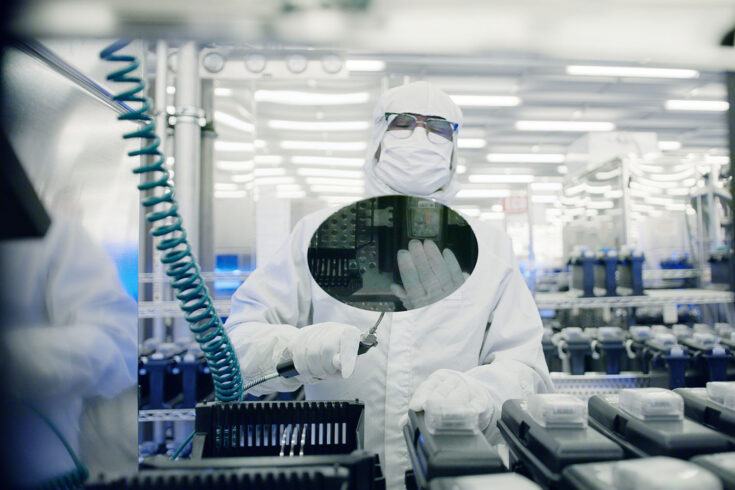Cloud storage is rapidly growing, and companies offering this service must physically store data on hard drive disk (HDD) storage. However, it is estimated that one server is required for every 600 smartphones or 120 tablet computers, with the cloud storage market growing at 30% per year.
HDDs are the only viable technology for cloud storage. Yet to meet fast annual market growth, HDD capacity must expand beyond one terabyte (TB) per square inch to more than 10TB per square inch.
Heat-assisted magnetic recording (HAMR) is a new technology enabling density increases in next-generation magnetic HDDs.
Overcoming technical challenges

A close-up of an HAMR hard drive.
Credit: Seagate Technology
In 2014 Queen’s University Belfast and the University of Glasgow partnered with Seagate Technology, the industry leader in data storage. The partnership co-created the Centre for Doctoral Training (CDT), which Northern Ireland’s (NI) Department for the Economy funded, with delivery from the Engineering and Physical Sciences Research Council (EPSRC).
The EPSRC CDT in Photonic Integration and Advanced Data Storage (PIADS) develops HAMR technology to overcome increased density challenges with low-cost manufacturing. It provides high-level training in photonics integration and data storage for growth.
The successful launch of the 2014 CDT was followed by a further £4.2 million investment from EPSRC in 2019.
This funding brought academic and industrial expansion to the consortium, including small and medium-sized enterprises (SMEs), supply chain companies, and wider UK and Irish co-partners, with co-investment from Science Foundation Ireland.
Building a regional photonic ecosystem
The consortium expansion enabled Northern Ireland to:
- increase scientist and engineer training in industrially-relevant technology and foreign direct investment
- build a regional photonic ecosystem, providing a foundational enabler for the 2021 UK Research and Innovation Strength in Places NI funding investment for the £62 million Smart Nano NI project
Professor Robert Bowman, Seagate Technology, Royal Academy of Engineering Research Chair and Director of the CDT, said:
CDT PIADS trains cohorts of high-calibre doctoral research students in data storage and photonics skill sets required by our partner base and the wider UK supply chain.
The strength of the CDT model and the ecosystem it creates has allowed Seagate Technology to work with us in two areas. One, in the co-creation of their sponsored doctoral projects, from university-based or industry-aligned PhDs and factory-based EngDs. And two, within skills delivery and hosting events, such as career profiles to the whole CDT cohorts.
This enduring collaboration has rapidly expanded research and development (R&D) capabilities in world-leading technology and created 60 R&D positions in Northern Ireland.
The CDT and collaboration with Seagate Technology has been instrumental in their success, with Seagate channelling £81 million since 2010 in foreign direct investment into NI.
Brendan Lafferty, Senior Engineering Director at Seagate Technology, said:
CDT PIADS is a great example of enabling a conveyor belt of world-class scientists and engineers with directly applicable skills to Seagate’s core requirements.
Dr Anthony Murphy, CEO of SME Causeway Sensors, said:
The PIADS CDT and the local photonics ecosystem were instrumental in helping Causeway Sensors raise £3.1 million in venture capital funding to date.
Causeway Sensors values the program so highly that we funded two studentships, helping us accelerate growth.

